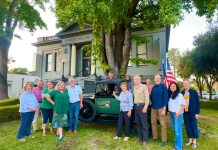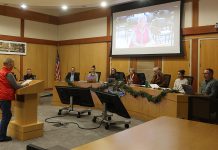- Outreach program to Latino community has been very effective,
but funds are running out
by BERT WILLIAMS, Staff Writer
“I’ve considered opening offices elsewhere,” Healdsburg
orthopedist John F. Toten said recently. “The one thing I would not
be able to live without though is Spanish translation.”
Many local healthcare providers have the same need. The need is
often filled by Ayudante.
Ayudante, a program that is unique in Northern California, was
started at Healdsburg District Hospital nearly four years ago,
funded by a $500,000 grant from the California Endowment. Mario
Guzman is the program’s first and only director.
Ayudante transformed the hospital’s approach to serving the
Latino community. Signs around the hospital became bilingual; forms
were translated into Spanish; workshops in cultural understanding
and conversational Spanish were offered to staff; a van was
purchased and a driver hired to bring patients to medical
appointments.
Perhaps most importantly, staff positions were created whose
primary purpose was to offer Spanish-English translation for
patients and hospital personnel. More was involved than just
words.
Ayudante’s mission was to create a cultural environment in which
Hispanic patients felt welcome.
Since Dr. Toten’s practice is located near the hospital, he has
the option call an Ayudante translator whenever he needs one, as do
other doctors in the area. “Pretty much, I can’t work without
them,” said Toten. In a working environment where doctors are
increasingly frustrated, and some are deciding to get out of town,
a service that encourages them to stay is no small thing.
For the hospital itself, Ayudante has become nearly essential.
“They have made a dramatic impact,” said CEO Dale Iverson. “They
have opened up the hospital to the Hispanic community.”
But despite extensive praise for the innovative program,
Ayudante is endangered. Last June its grant from the California
Endowment ran out and was not renewed.
The hospital was faced with an acute dilemma. At a time when
every patient was critical to its survival, the hospital could
scarcely afford to cut a service that brings in patients. But with
books awash in red ink, the hospital was in no position to assume a
new financial burden.
That Ayudante has survived at all — funded since June solely by
the struggling hospital — is a measure of its value to the
institution. That it will continue to survive in its present form,
however, is not likely.
According to Iverson, some of Ayudante’s important initial work
has been completed. Bilingual signs are in place; Spanish forms are
available; staff sensitivity to the Hispanic culture has been
heightened. Two Ayudante functions for which there is a continuing
need, however, are translation and transportation.
Toten said that, even though he can understand Spanish pretty
well, his level of fluency is inadequate for conversing with his
patients about important and complex medical issues.
Pat Carini, the hospital’s chief nursing officer, agreed.
“Language barriers in clinical, health-related situations are
critical,” she said. “Error can result in real harm.”
The need for Ayudante has been fully integrated into the
consciousness of the local healthcare community, but the program
itself remains separate. The sole task of Ayudante staff members
has been to bridge the gap between healthcare providers and the
Hispanic community. As important as that role has become, it
remains an add-on.
“Ayudante was vulnerable because it wasn’t integral,” said
Guzman. “My mission, since we were denied funds, has been to
incorporate it into the system.”
Guzman has produced a 38-page document filled with charts,
graphs, a detailed rationale, and a fresh set of job descriptions
designed to facilitate that integration. An important part of the
plan is to infuse essential existing hospital jobs with Ayudante
skills and sensitivity. “Our goal,” Guzman wrote in a recent memo
to the hospital staff, “is to bring the Ayudante services under the
umbrella of the hospital as full-time employees.”
“This is going to take time,” said Guzman. “The goal is to start
incorporating bilingual interpreters into key existing positions in
ER and admitting.” This will be accomplished as staff turnover
opens up positions in those departments. Imbedding Ayudante skills
within existing positions will sustain a key component of Ayudante
at minimal cost to the hospital.
But other departments in the hospital, and medical offices such
as Dr. Toten’s, cannot be served effectively by employees who work
full time in admitting and the emergency room. For this purpose
Guzman has designed a position that he describes as a “rover.”
The rover will provide translation throughout the hospital and
beyond, and will also be cross-trained as a community resource
planner and patient advocate.
A big problem in the Latino community, according to Guzman, is a
failure to understand the U.S. medical system. “This isn’t Mexico,”
Guzman sometimes tells patients. “We have a system and you’ve got
to work within the system. It’s a good system, but you have to
learn some things about how it works.” An important role for
Ayudante’s roving interpreter will be to help patients understand
and gain access to the services they need.
As Guzman was working to create Ayudante’s new job descriptions,
weaving the program’s salient features into the fabric of the
hospital, he came to a sudden realization: “Hey, everybody’s got a
job but me! I went through all this work, and now I don’t have a
job anymore.”
The hospital administration did not agree. “He is a very
valuable asset to this community,” said Iverson, who expects
Guzman’s job to change, but not to be eliminated. Iverson foresees
an expanded role for the Ayudante director — one that will include
representing the hospital within the larger community.
So it seems likely that Ayudante’s role as a cultural bridge in
the healthcare community will continue in some form. The most
daunting challenge, at this point, is continuing to fund Ayudante’s
transportation component — a van which transports patients to the
hospital, to Alliance Medical Center and to doctor’s offices from
spots throughout the north county. Operating costs for the van,
including the driver’s salary, are about $32,000 a year.
The hospital has committed $10,000 to the van. Alliance Medical
Center has offered another $6,000. Guzman is hoping that additional
support for operating expenses will come from Copper Tower Family
Medical Center in Cloverdale, the Cloverdale Health District and
from local doctors.
“Our physicians have expressed their desire to contribute,” said
Guzman. So far, local doctors have pledged $1,350 toward the van
and the cost of the roving translator, he said. Whether there will
be enough support to keep those programs viable remains to be
seen.
But Guzman remains optimistic. “The hospital is supporting the
transition,” he said. “They’re 100 percent behind the new plan, and
understand that it’s not going to happen overnight … as long as we
continue to cut costs and make progress, they haven’t given me a
deadline.”
Guzman also said that the California Endowment might offer
financial support in the future. “They want to see sustainability,”
said Guzman. “They want to know, ‘Where is the local commitment if
everybody is raving about this program?’ … If we can show community
commitment to long term sustainability they may commit some funds
to us again.”
That community commitment will be a major factor in the long
term survival of Ayudante. For more information about the Ayudante
services and fund-raising efforts, phone Mario Guzman at
431-6464.








